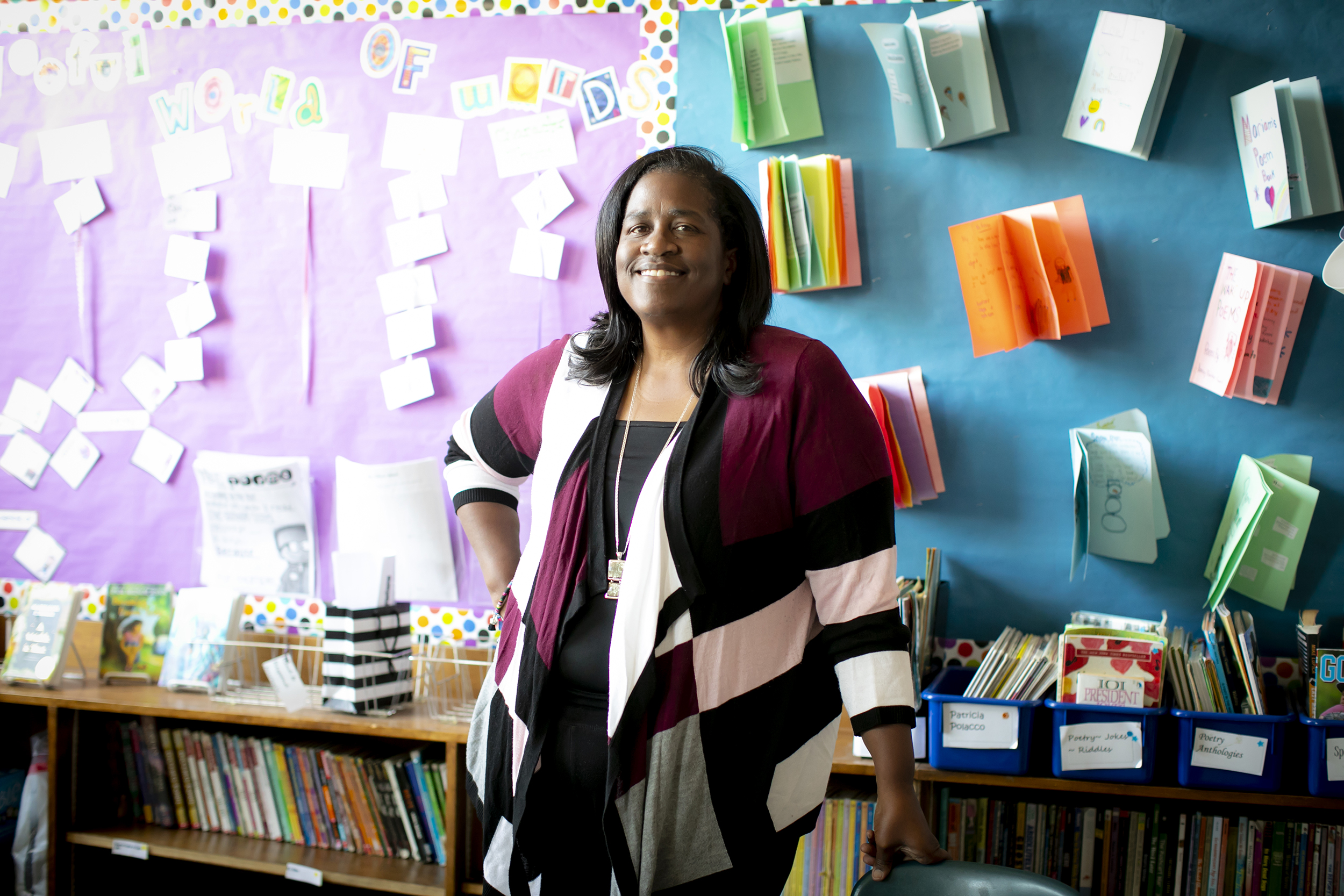
“With Mind Matters we’re able to give parents really specific tools that they’re then able to utilize with their kids,” said Fletcher Maynard Academy principal Robin Harris
Rose Lincoln/Harvard Staff Photographer
A whole-family approach
Cambridge principal gives high grades to Harvard’s ‘Mind Matters’ program
For the past six years, Harvard’s public school partnerships team has offered the Mind Matters: Families Make a Difference program to schools in Cambridge and Boston. The initiative draws from cutting-edge research to give families practical skills and understanding related to early childhood development. With a particular focus on children aged 3 to 9, the program provides families with resources to support kids emotionally, socially, and academically.
Fletcher Maynard Academy (FMA) in Cambridge has been offering Mind Matters to its families since the 2016–17 school year. The Gazette sat down with principal Robin Harris to talk about the impact of the program at FMA.
Q&A
Robin Harris
GAZETTE: How important is family engagement to the success of students?
HARRIS: I’m a true believer in family engagement. It’s incredibly important. First and foremost, it’s about the relationships that all of us have with the students we see every day. But it’s also about building and forging relationships with families and parents and guardians and grandparents and the extended families of our students. Because learning is a real partnership. We want to get to know the kids. What makes them tick? What gets them excited? What are the parents’ goals for their kids? Our teachers can see the difference that relationships make in the long run. But it’s also important to understand that family engagement can come in many different shapes. It’s how you define engagement. And it looks different to different people. But ultimately we’re all after the same goal: the success of our students.
GAZETTE: How does Mind Matters fit into this model?
HARRIS: I wish every single parent had Mind Matters. With Mind Matters we’re able to give parents really specific tools that they’re then able to utilize with their kids. We’re able to equip them with some of the knowledge and some of the research that’s out there about different things — such as brain development. As parents, sometimes you’re just flying by the seat of your pants. But now you’ve got an opportunity to really learn about some of the research, the why and the how behind some of the advice we hear so often. You’re learning the science — the proven research. You no longer have to simply just shoot from the hip. You’re learning best practices. Mind Matters is equipping our families with knowledge that they probably wouldn’t have gotten on their own, and it’s knowledge that can make a real difference in the lives of the students.
GAZETTE: What has been some of the feedback that you’ve heard from participants?
HARRIS: Families who’ve participated have learned a lot. And an added benefit is that this knowledge — these practices — really crosses socioeconomic lines. There is something in it for everybody, regardless of background. We have parents who have graduate degrees, and we have parents who don’t have high school diplomas — but who are both learning together about how best to help their children — because ultimately we all want our children to be happy and successful. It’s rewarding to see how many different families are taking advantage of the learning.
One of the other residual effects of the workshops is that they create bonds and relationships among the parents.
GAZETTE: What made you want to help bring Harvard’s Mind Matters program to other schools in the Cambridge Public Schools district?
HARRIS: We found that a lot of our parents were talking at their kids, and not necessarily with their kids. Mind Matters gives parents different tools in which to have conversations with their kids. And it makes a difference because now interactions can become more than just directives. Now they’re having actual conversations with their child, engaging kids in some discourse. And that’s just a real mind shift for some folks. It helps parents realize that making time to be present and interact with their children is very, very important.
After FMA first started participating in the Mind Matters program, we thought, “Oh my gosh, wouldn’t it be awesome if every parent had this opportunity? Why stop with us? Every school should do this. This is good, rich information.” So we started talking to our colleagues at their respective schools, and it just starting growing from there.
Mind Matters is available in elementary schools in Cambridge, as well as in schools in Boston’s Allston-Brighton neighborhood.




